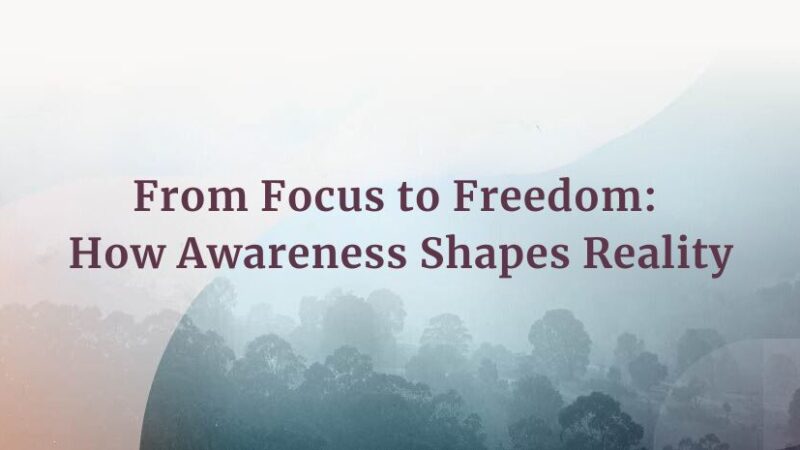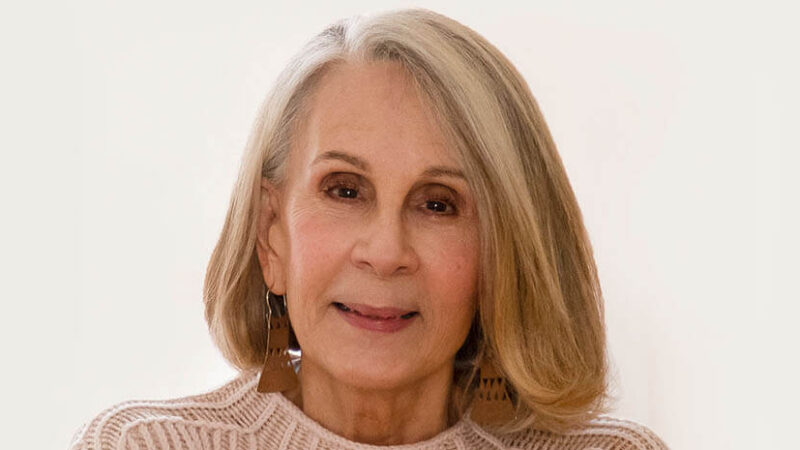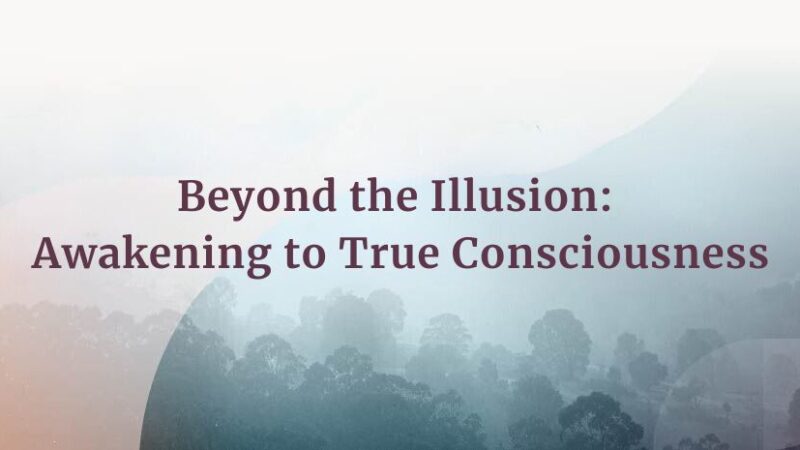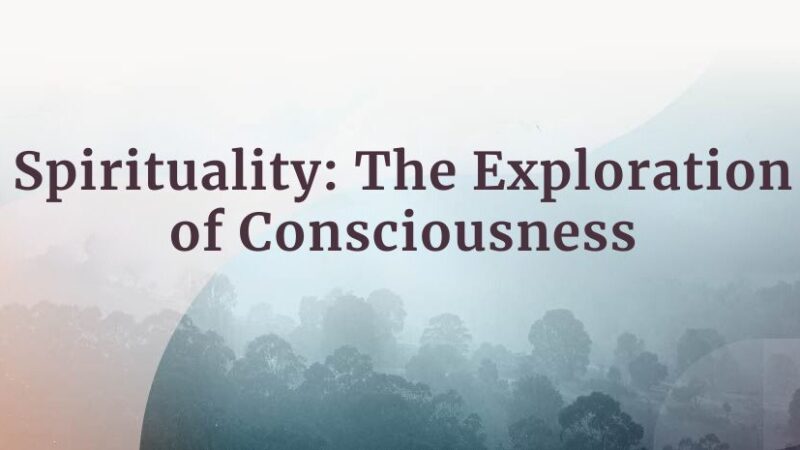-
E117: The Real Work: Letting Go from Within
Michael Singer — October 2, 2025
True spirituality isn’t about mystical experiences or lofty ideals—it’s about honestly facing...
-
Once More: Reflections on Reincarnation and the Gap Between Lives
Tami Simon — September 26, 2025
In this special reflection episode of Insights at the Edge host Tami Simon looks back on her...
-
Honey Tasting Meditation: Build Your Relationship with Sweetness
There is a saying that goes “hurt people hurt people.” I believe this to be true. We have been...
Written by:
Amy Burtaine, Michelle Cassandra Johnson
-
Many Voices, One Journey
The Sounds True Blog
Insights, reflections, and practices from Sounds True teachers, authors, staff, and more. Have a look—to find some inspiration and wisdom for uplifting your day.
Standing Together, and Stepping Up
Written By:
Tami Simon -
The Michael Singer Podcast
Your Highest Intention: Self-Realization
Michael Singer discusses intention—"perhaps the deepest thing we can talk about"—and the path to self-realization.
This Week:
E116: Doing the Best You Can: The Path to Liberation -
Many Voices, One Journey
The Sounds True Blog
Insights, reflections, and practices from Sounds True teachers, authors, staff, and more. Have a look—to find some inspiration and wisdom for uplifting your day.
Take Your Inner Child on Playdates
Written By:
Megan Sherer
600 Podcasts and Counting...
Subscribe to Insights at the Edge to hear all of Tami's interviews (transcripts available, too!), featuring Eckhart Tolle, Caroline Myss, Tara Brach, Jack Kornfield, Adyashanti, and many more.
Most Recent
E59: From Focus to Freedom: How Awareness Shapes Reali...
Deep spiritual states transcend the mind, but the mind can be a useful tool for spiritual growth. You know your consciousness can concentrate on a single object or expand to include everything in front of you. Likewise, your concept of self can be narrowly focused on your ego-mind, or it can expand to include thoughts of this vast universe. You suffer when your mind’s perception of reality does not align with its personal desires and fears. Spiritual growth involves letting go of this ego-mind and honoring all of life as your participation in the Divine Creation. True freedom is found in ceasing to contract awareness, which allows its natural expansion beyond the personal self.
For more information, go to michaelsingerpodcast.com.
© Sounds True Inc. Episodes: © 2025 Michael A. Singer. All Rights Reserved.
Zulma Reyo: The Radiant Sun of the Heart
Each of us has a sense of ourselves as a separate and distinct individual, or what’s commonly called the personality or the ego. Yet beneath the surface of who we take ourselves to be shines a radiant and holy true Self, or who we are at the soul level. In this podcast, Sounds True’s founder, Tami Simon, speaks with celebrated spiritual teacher and author Zulma Reyo about the continual work of releasing the limitations of the egoic self to uncover and express the light and love of our deepest nature.
Drawing on insights from the books Inner Alchemy and Emergence of Consciousness, Zulma and Tami explore: the gift of etheric sight; the relationship between the personality and the soul; ego death; objective self-observation; the lifelong process of clearing out stuck emotional energies; the three energy bodies of the personality; turning your attention from the personality to your deeper, inner self; finding community support; seeing the purity within others; working on yourself as an act of service to the world; humility and self-honesty; the practice of letter writing; giving yourself the love and acceptance you didn’t receive as a child; a guided experience of Zulma’s alchemical alignment practice; connecting to the radiant sun within yourself; forgiving the unforgivable; the emergence of a new group consciousness; examining your attachments; and more.
Note: This episode originally aired on Sounds True One, where these special episodes of Insights at the Edge are available to watch live on video and with exclusive access to Q&As with our guests. Learn more at join.soundstrue.com.
E58: Beyond the Illusion: Awakening to True Consciousn...
The findings of modern science and the deep spiritual teachings are moving closer and closer together. Our entire outside world is composed of tiny atoms that our senses blend together to create what we call reality. Advanced physics has found that these atoms emanate from wavelets in the omnipresent Quantum Field. Spirituality has always taught that reality is an illusion, a dance of Light.
Every day, your senses take in this illusion, and you build a false sense of self based on the experiences you’ve had. This is your ego, and it is the cause of all personal suffering. Behind it is the real you, the consciousness that is aware of your thoughts, emotions, and the outside world. The meaning of life is to transcend the illusion and return to the source of consciousness. This is Enlightenment.
For more information, go to michaelsingerpodcast.com.
© Sounds True Inc. Episodes: © 2025 Michael A. Singer. All Rights Reserved.
Customer Favorites
A Ceremony to Greet the Cardinal Directions

Greeting the cardinal directions is a common practice in shamanic cultures. There is no one right way shamans greet the directions. Honoring the directions was often based on weather patterns in the local area, specifically which direction the wind entered the land.
I encourage you to find your own way to greet the directions. We all know East is the direction of the rising sun and West is the direction of the setting sun. The direction away from the equator reminds us of winter and cold, while the opposite direction invokes a feeling of warmth.
Some people make medicine wheels that they stand within when doing ceremonial work. You might find objects in nature such as a feather, rock, or crystal. Or you might light a candle or put out a bowl of water to honor qualities you feel represent a given direction.
An Exercise to Call in the Directions
As you did when calling in helping spirits, take some time to reflect on the directions.
Stand and face East. Close your eyes and place your hands on your heart. As you focus your imagination on the East and the rising sun, what feelings emerge for you?
Turn South and let your imagination soak in the qualities that come to you associated with the South.
Face West and take a deep breath and exhale. In your mind’s eye, see and feel the sun setting. What associations does this bring to you?
Next, face North and observe how you feel in your heart. What meaning does the North hold for you?
In some cultures, the direction of Below is greeted to honor Earth.
And the direction of Above is welcomed to honor Sky.
Lastly, the direction of Within is acknowledged to honor the power of spirit and divine light that resides in each us.
Excerpted from The Book of Ceremony: Shamanic Wisdom for Invoking the Sacred in Everyday Life, by Sandra Ingerman.
___________________________________________________________________________________________________
 Sandra Ingerman, MA, is an award-winning author of 12 books, including Soul Retrieval: Mending the Fragmented Self, Medicine for the Earth, Walking in Light, and The Book of Ceremony. She is the presenter of several audio programs produced by Sounds True, and she is the creator of the Transmutation App. Sandra is a world-renowned teacher of shamanism and has been teaching for more than 30 years. She has taught workshops internationally on shamanic journeying, healing, and reversing environmental pollution using spiritual methods. Sandra is recognized for bridging ancient cross-cultural healing methods into our modern culture, addressing the needs of our times.
Sandra Ingerman, MA, is an award-winning author of 12 books, including Soul Retrieval: Mending the Fragmented Self, Medicine for the Earth, Walking in Light, and The Book of Ceremony. She is the presenter of several audio programs produced by Sounds True, and she is the creator of the Transmutation App. Sandra is a world-renowned teacher of shamanism and has been teaching for more than 30 years. She has taught workshops internationally on shamanic journeying, healing, and reversing environmental pollution using spiritual methods. Sandra is recognized for bridging ancient cross-cultural healing methods into our modern culture, addressing the needs of our times.
Sandra is known for gathering the global spiritual community together to perform powerful transformative ceremonies, as well as inspiring us to stand strong in unity so we do our own spiritual and social activism work while keeping a vision of hope and being a light in the world.
She is passionate about helping people to reconnect with nature. Since the 1980s, thousands of people have healed from past and present traumas through the classic cross-cultural shamanic healing method Sandra teaches called “Soul Retrieval.”
She is a licensed marriage and family therapist and professional mental health counselor. She is also a board-certified expert on traumatic stress. She was awarded the 2007 Peace Award from the Global Foundation for Integrative Medicine. Sandra was chosen as one of the Top 10 Spiritual Leaders of 2013 by Spirituality and Health magazine.
Sandra has had two new books released in 2018. The Hidden Worlds was co-written with Katherine Wood and is a novel written for young adults to help them navigate the changing world. The Book of Ceremony was written for a shamanic and general audience on how to bring the sacred into daily life by performing shamanic ceremonies designed for our times and the challenges we are facing today.
 Buy your copy of The Book of Ceremony at your favorite bookseller!
Buy your copy of The Book of Ceremony at your favorite bookseller!
Sounds True | Amazon | Barnes & Noble | Indiebound

S1 E4: Spirituality: The Exploration of Consciousness
What do psychology and spirituality have in common? In this podcast, Michael Singer discusses how both psychology and spirituality help us illuminate the nature of the human mind and the mystery of consciousness. When we resist experiences we find uncomfortable, he explains, we begin to “make a mess” of our inner lives. Through the teachings and practices made available in spirituality and psychology, we can do the work of cleaning things up, purifying the flow of our life-force energy and returning to the ecstatic states we were meant to live in.
For more information, go to michaelsingerpodcast.com.
© Sounds True Inc. Episodes: © 2024 Michael A. Singer. All Rights Reserved.
Raw Blueberry Cheesecake
Raw Vegan Blueberry Cheesecake
From the book, Whole Girl by Sadie Radinsky
Yield: 8 servings
INGREDIENTS:
CRUST
- 1 ½ cups roasted pecan pieces
- 2 Tbsp monk fruit maple-flavored syrup or pure maple syrup
- 1 Tbsp coconut oil, melted
FILLING
- 2 cups raw cashews or cashew pieces, soaked overnight in 4 cups of water, then rinsed
- 1 cup freeze-dried or fresh blueberries
- ½ cup coconut cream, from the top of a chilled 13 1/2-ounce can of full-fat coconut milk
- 2 Tbsp monk fruit maple-flavored syrup or pure maple syrup
- 2 Tbsp fresh lemon juice
- 2 Tbsp coconut oil, melted
- 1 cup fresh blueberries
INSTRUCTIONS:
CRUST
- Line the bottom of a 6-inch springform cake pan with a circle of parchment paper and set aside.
- In a high-speed blender, blend together the crust ingredients just until it forms a dough-like consistency. It might help to use your blender’s tamper, if you have one. Do not overblend or it will turn into pecan butter!
- Press the pecan crust evenly into the bottom of the cake pan and place in the freezer while you prepare the filling.
FILLING
- Without washing your blender, combine the filling ingredients (except for 1 cup of fresh blueberries) and blend until completely smooth.
- Pour the filling onto the frozen crust and top with 1 cup fresh blueberries. Place in the freezer for approximately 5 hours, or until it’s frozen through.
- Using a butter knife, gently swipe around the inside of the pan to loosen the cake. Remove the cake from the springform pan. Slice and serve. Store any leftover cake in an airtight container in the freezer for up to 1 month. Thaw for 15 minutes before serving.

This recipe is featured in the young adult book, Whole Girl: Live Vibrantly, Love Your Entire Self, and Make Friends with Food by Sadie Radinsky.
 Sadie Radinsky is a 19-year-old blogger and recipe creator. For over six years, she has touched the lives of girls and women worldwide with her award-winning website, wholegirl.com, where she shares paleo treat recipes and advice for living an empowered life. She has published articles and recipes in national magazines and other platforms, including Paleo, Shape, Justine, mindbodygreen, and The Primal Kitchen Cookbook. She lives in the mountains of Los Angeles. For more, visit wholegirl.com.
Sadie Radinsky is a 19-year-old blogger and recipe creator. For over six years, she has touched the lives of girls and women worldwide with her award-winning website, wholegirl.com, where she shares paleo treat recipes and advice for living an empowered life. She has published articles and recipes in national magazines and other platforms, including Paleo, Shape, Justine, mindbodygreen, and The Primal Kitchen Cookbook. She lives in the mountains of Los Angeles. For more, visit wholegirl.com.
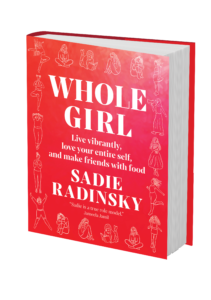 Sounds True | Amazon | Barnes & Noble | Bookshop | Indiebound
Sounds True | Amazon | Barnes & Noble | Bookshop | Indiebound

